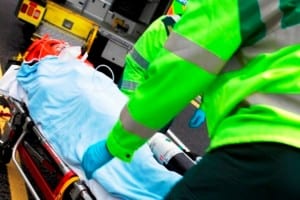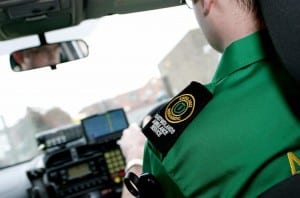 Members of CaHRU, led by Prof Niro Siriwardena, have recently started a new programme of collaborative research with East Midlands Ambulance Service NHS Trust using ambulance data. The 3-year programme is part of the NIHR Applied Research Collaboration East Midlands under the theme of Building Community Resilience and Enabling Independence led by Prof Marion Walker.
Members of CaHRU, led by Prof Niro Siriwardena, have recently started a new programme of collaborative research with East Midlands Ambulance Service NHS Trust using ambulance data. The 3-year programme is part of the NIHR Applied Research Collaboration East Midlands under the theme of Building Community Resilience and Enabling Independence led by Prof Marion Walker.
The first study in the programme is the Ambulance ‘Hypos can Strike Twice’ (Ambu-HS2) study which is seeking to investigate the effect of implementing an ambulance clinician delivered  hypoglycaemia intervention on repeat ambulance calls, attendances and transportation to hospital using a non-randomised stepped wedge and process evaluation. The study team includes members of CaHRU (Prof Niro Siriwardena, Prof Graham Law, Dr Murray Smith, Dr Elise Rowan and Ms Despina Laparidou), PPI representatives (Mrs Amanda Brewster, Mr Keith Spurr, Mrs Pauline Mountain), East Midlands Ambulance Service NHS Trust (Mrs Sally Dunmore, Rob Spaight, Dr Leon Roberts), and University of Leicester (Prof Kamlesh Khunti, June James).
hypoglycaemia intervention on repeat ambulance calls, attendances and transportation to hospital using a non-randomised stepped wedge and process evaluation. The study team includes members of CaHRU (Prof Niro Siriwardena, Prof Graham Law, Dr Murray Smith, Dr Elise Rowan and Ms Despina Laparidou), PPI representatives (Mrs Amanda Brewster, Mr Keith Spurr, Mrs Pauline Mountain), East Midlands Ambulance Service NHS Trust (Mrs Sally Dunmore, Rob Spaight, Dr Leon Roberts), and University of Leicester (Prof Kamlesh Khunti, June James).
 The research is being carried out to understand the effect of ambulance staff delivering the “Hypos can strike twice” intervention on people with diabetes experiencing hypoglycaemia (or “hypo”, meaning low blood sugar) to help prevent further “hypos” and negative impacts on future patient health. The study addresses NHS priorities around diabetes, redesigning urgent and emergency care to improve patient care and strengthen primary and community care.
The research is being carried out to understand the effect of ambulance staff delivering the “Hypos can strike twice” intervention on people with diabetes experiencing hypoglycaemia (or “hypo”, meaning low blood sugar) to help prevent further “hypos” and negative impacts on future patient health. The study addresses NHS priorities around diabetes, redesigning urgent and emergency care to improve patient care and strengthen primary and community care.
Prof Niro Siriwardena
